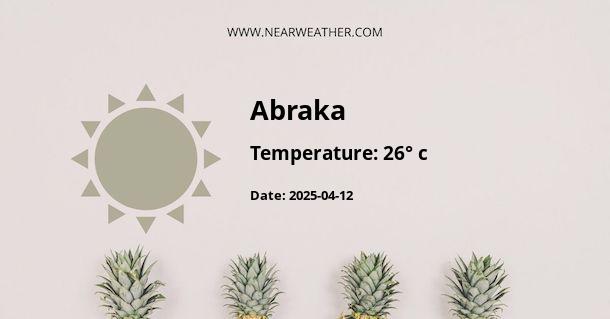Abraka, Nigeria: Climate and Weather Year Round
Abraka is a town located in the Ethiope East Local Government Area of Delta State in Nigeria. It is situated in the southern part of the country and is known for its unique climate and weather patterns. In this article, we will explore the climate of Abraka and provide detailed information about its weather throughout the year.
Climate Classification
Abraka falls under the tropical savanna climate classification, also known as Aw according to the Köppen climate classification system. This classification is characterized by distinct wet and dry seasons, with relatively high temperatures throughout the year.
Temperature
The temperature in Abraka remains fairly consistent throughout the year, with only slight variations. The average annual temperature ranges from 25 to 30 degrees Celsius (77 to 86 degrees Fahrenheit). The hottest months are usually between February and April, with temperatures reaching their peak during this period.
During the dry season, which typically occurs between November and March, temperatures can soar as high as 35 degrees Celsius (95 degrees Fahrenheit) during the day. However, nights tend to be cooler, with temperatures dropping to around 20 degrees Celsius (68 degrees Fahrenheit).
On the other hand, during the rainy season, which spans from April to October, temperatures tend to be slightly lower, ranging from 25 to 30 degrees Celsius (77 to 86 degrees Fahrenheit) during the day. Nights remain relatively warm, with temperatures averaging around 23 degrees Celsius (73 degrees Fahrenheit).
Rainfall
Abraka experiences a significant amount of rainfall over the course of the year. The rainy season, which lasts from April to October, is characterized by frequent showers and occasional thunderstorms. The peak of the rainy season occurs between June and September.
During this period, Abraka receives an average annual rainfall of around 1,500 to 2,000 millimeters (59 to 79 inches). These heavy rains contribute to the lush greenery and vibrant vegetation that can be seen throughout the region.
Humidity
The high humidity levels in Abraka are attributed to its proximity to the Niger River and the nearby Niger Delta region. Relative humidity remains relatively high throughout the year, ranging from 70% to 90%. The combination of high humidity and warm temperatures can make the climate feel quite tropical and sticky.
Wind Patterns
Abraka experiences a prevailing wind pattern that blows from the southwest for a significant portion of the year. These southwesterly winds are influenced by the movement of the Inter-Tropical Convergence Zone (ITCZ), which shifts northward during the northern hemisphere summer and southward during the northern hemisphere winter.
Seasonal Climate Overview
Here is a breakdown of the climate and weather in Abraka throughout the year:
| Season | Temperature Range | Rainfall |
|---|---|---|
| Dry Season (November - March) | 25°C - 35°C (77°F - 95°F) | Low rainfall, occasional showers |
| Rainy Season (April - October) | 25°C - 30°C (77°F - 86°F) | Heavy rainfall, frequent showers and thunderstorms |
Conclusion
Abraka, Nigeria exhibits a tropical savanna climate with distinct wet and dry seasons. The town experiences relatively high temperatures throughout the year, with the hottest months falling between February and April. The rainy season, which lasts from April to October, brings heavy rainfall and occasional thunderstorms. The humidity remains high, and the prevailing winds come from the southwest. Understanding the climate and weather patterns in Abraka can help residents and visitors plan their activities and make the most of their time in this vibrant Nigerian town.
A - Abraka's Latitude is 5.790230 & Longitude is 6.104730.
A - Weather in Abraka is 26° today.
A - Climate Conditions in Abraka shows broken clouds today.
A - Humidity in Abraka is 86% today.
A - Wind speed in Abraka is 6.23 km/h, flowing at 213° wind direction. today.
